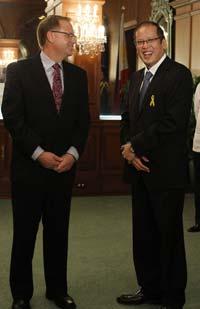Peace accord creates an identity

Canada’s Ambassador to the Philippines Christopher Thornley welcomed the signing of the Framework Agreement between the Government of the Philippines and the Moro Islamic Liberation Front.
“Canada welcomes the signing of the Framework Agreement on the Bangsamoro, and the initiation of a process aimed at lasting peace, governance and prosperity in Mindanao,” said Ambassador Thornley in a statement.
He also lauded “the diligent efforts of all sides, particularly the Government of the Philippines, bring the dawning of a new era of opportunities for the people of Mindanao, the people of the Philippines, and partners in the surrounding region.”
Thornley also said that Canada extends its best wishes to the members of the Transition Commission as they begin the work in developing the legal framework for the establishment of the Bangsamoro, and the full implementation of the agreement.
The signing of the peace accord this week at Malacanang Palace in Manila will, most importantly, create an identity for the Bangsamoro, academics and analysts said adding this is the key to putting an end to all the years of fighting.
“What we have won with the signing of the peace accord is the politics of identity, which is recognition of the Bangsamoro,” said Datu Michael O. Mastura, a senior member of the Moro Islamic Liberation Front negotiating panel in the Philippines government-MILF peace process.
Datu Mike, as he is fondly called here, said the term Bangsamoro had a wide-reaching concept, rather than just a name.
“It is a term that encompasses everything, including rights of the Bangsamoro on things that we have fought for.”
One of the most special aspects of this new entity is its “power-sharing and wealth-sharing” rights vis-a-vis the national government, with an accompanying power “to create its own sources of revenue”.
The existing syariah courts would also be strengthened by expanding their jurisdiction and giving them “competence over the syariah justice system”. The document also mentions “basic rights” ought to be afforded the “citizens residing in the new political entity”.
Datu Mike said the next step after the signing of the peace accord would be tougher, as it would lead to the issuance of an executive order by President Benigno Aquino to establish a 15-member “transition commission” that would flesh out the details of the preliminary agreement and draft basic laws creating the Muslim autonomous region.
The establishment of the new “state” is targeted to be done before Aquino’s term ends in 2016, and the process will have to go through Congress and Senate before the constitutional amendment is made.
“While waiting for this, we will still hold on to our arms and later integrate the (MILF) soldiers into the Bangsamoro police force which will be responsible to the national government, the assembly and the people.”
The Organisation of Islamic Cooperation (OIC) regional human rights director Laisa Masuhud Alamia said the establishment of a new autonomous political entity to replace the Autonomous Region in Muslim Mindanao (ARMM) will ultimately solve the problem of internally displaced persons (IDP).
Recent statistics show that there are 10,695 IDPs as a result of the clashes in Maguindano and North Cotabato and 9,790 IDPs in the Basilan conflict.
Laisa said it was also hoped that elections to be called in the new autonomous region, targeted for 2016, will spell the end of violence in the region.
Leave a comment






